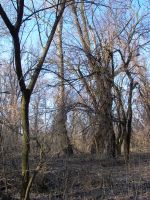|
Threatened
forests of the Hungarian Plain
According to forestry statistics the area of forests is continuously
increasing in Hungary, thanks to the versatile subsidy schemes,
but the real tendency is just the opposite – states the report
compiled by Nimfea Environment and Nature Conservation Association.
The report uses case studies to illustrate the threats to
the forests of the Great Hungarian Plain.
A plantation of trees of the same type and of the
same age is not a forest in the biological term; neither provides
social and public services. The area of real forest is deceasing
fast, partly due to the activities of the so called “wood
mafia”, private logging of forests ignoring management plans,
as well as energetic use of the forest biomass. Unfortunately
the government is not a good owner of the forests either:
state owned forest managers sometimes also contribute to the
destruction of forests.
Nimfea Environmental and Nature Conservation Association
is willing to counteract this worrying trend, based on the
results of this report.
Nature conservation authorities in Hungary have been shrinking
during the last years regarding both their competence and
the number of staff also. The most serious loss of the sector
is the lack of powerful and vigorous authority background,
simplifying the progress of environmentally harmful, destructive
or illegal economic activities, constructions and investments.
This situation increases the pressure on NGOs to step in instead
of the authorities, and take the necessary legal steps to
enforce environmental legislation and ensure public participation.
Nimfea Association needed to start six legal processes against
the forest management corporation of the Southern Plain (Dalerd
Zrt.), including a civil, criminal and administrative legal
actions.
Until these lengthy processes bring any result,
semi-natural and old forests are in continuous decline, illegal
logging is common practice and the last forest habitats of
the Great Hungarian Plain face everyday threats.
„Forests are seriously endangered at several locations” says
Ákos Monoki, leader of the biodiversity framework program
of the Association. “We try to check on the spot every case
of logging that we are informed about, and our sad experiences
show that forest managers are not always cooperating partners.
One success story stands against nine failures. There are
forests, where the manager is dedicated to preserve valuable
habitats, but the activities of Dalerd Zrt. pose a threat
to several hundreds of hectares, that’s why it is necessary
to go to court.”
„Unfortunately forests are threatened not only by illegal
logging, but also the negative attitude of forest managers”
gives a summary of the report Benedek R. Sallai, the managing
director of the Association. “The actions of the above mentioned
Dalerd Zrt. has repeatedly compromised natural values: they
have hindered the establishment of a landscape protected area;
they are setting up a garden for wild boars on the habitat
of a moth listed in the Annex of the Habitat Directive
(Fisher's Estuarine Moth, Gortyna borelii), in which case
the construction of the fence already destroyed a significant
part of the protected plant community; in another case the
introduced wild boars threaten a Site of Community Importance,
ignoring the relevant national and EU legislation; they have
clear-cut a willow-poplar (Salix, Populus) woodland, situated
in a Natura 2000 site, on the bank of the River Tisza, without
the intention to replant any trees – and the list could be
continued” mentions some concrete examples Mr. Sallai. “Another
problem is that the principles of public participation are
not respected, and the access to information is also often
refused regarding forest management plans and other forest-related
issues.”
This trend of establishing more and more wild-boar gardens
for hunting purposes is especially remarkable, taking into
account that relevant scientific data all show that increasing
game populations impose the most significant pressure on forest
ecosystems. These are worrying signs that the lobbying of
hunters can undermine nature conservation interests and economic
rationality as well.
“We are convinced that nature conservation and forestry should
go hand in hand. Commitment and cooperation is needed to ensure
sustainable forest stewardship, and we will work forward strengthening
this partnership” says the report of Nimfea Environmental
and Nature Conservation Association.

|

